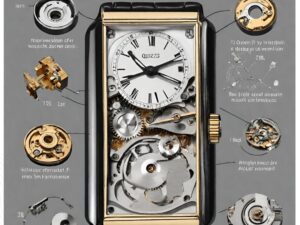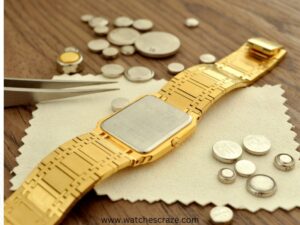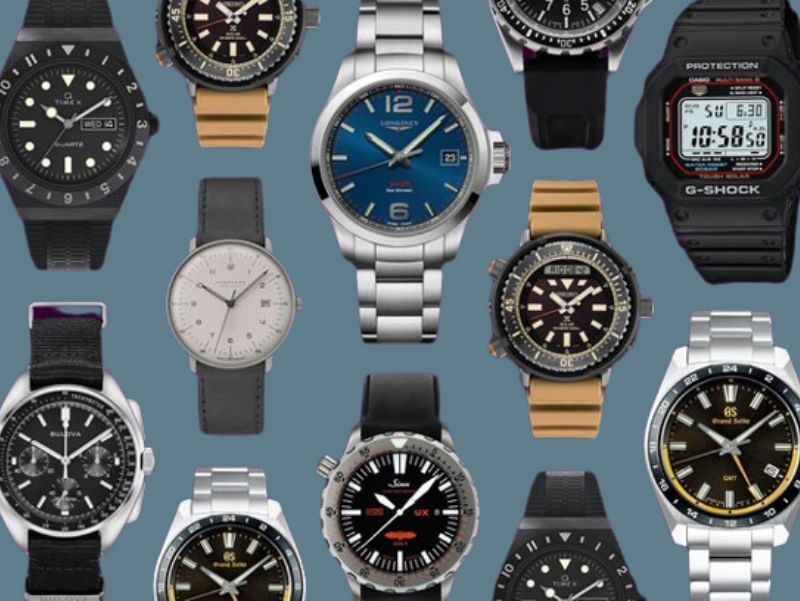How Long Do Quartz Watches Last
Quartz watches, those reliable timekeepers you wear on your wrist, are built to last. They’re like your steadfast companion in the world of time. The good news is, they don’t just last a short while – they’re in it for the long run. These watches are known for their longevity, often ticking away for 10, 20, or even more years without a hitch. As long as you show them a little care, they’ll keep on working faithfully, making sure you’re never late for that important appointment or special occasion. So, if you’re curious about the endurance of your trusty quartz watch, rest assured it’s here to stay.
Components of a Quartz Watch

1. Quartz Movement:
The heart of a quartz watch is a small, precisely cut piece of quartz crystal that vibrates at a specific frequency when an electric current is applied. These vibrations are used to measure time accurately.
2. Battery:
Quartz watches are powered by a small battery, typically a silver oxide or lithium battery, which provides the electrical energy needed to operate the watch.
3. Case and Crystal:
-
- Case: The outer shell of the watch, often made of metal or plastic, protects the inner components and provides a stylish enclosure.
- Crystal: The transparent cover that protects the watch face. Most quartz watches use mineral crystal or synthetic sapphire crystal for durability and scratch resistance.
4. Watch Hands and Dial:
-
-
- Watch Hands: The metal or plastic pointers on the watch face indicate hours, minutes, and seconds. They move in response to the quartz movement’s precise timing.
- Dial: The watch face or background where numbers, markers, and other indicators are placed. It provides a visual reference for reading the time.
-
5. Strap or Bracelet:
-
-
-
- Strap: Typically made of leather, rubber, fabric, or synthetic materials, the strap attaches the watch to the wrist. It comes in various styles and can be easily replaced.
- Bracelet: Some watches feature a metal bracelet, often made of stainless steel, which provides a more durable and formal option for securing the watch to the wrist.
-
-
Factors Affecting Quartz Watch Lifespan

Quality of Components:
The longevity of a quartz watch heavily depends on the quality of its internal components, including the movement, battery, and materials used in the case, crystal, and strap. High-quality components often result in a longer-lasting watch.
Frequency of Use:
How often you wear and use the watch can impact its lifespan. Continuous use may lead to more wear and tear on moving parts and components, potentially shortening its life.
Environmental Conditions:
- Temperature: Extreme temperatures, both hot and cold, can affect the watch’s performance and longevity.
- Humidity: Excessive moisture or exposure to water can lead to internal corrosion and damage.
- Pressure: Watches subjected to high pressure, such as deep-sea diving watches, need to be properly sealed to prevent damage.
Maintenance and Care:
Regular maintenance and proper care play a crucial role in extending a quartz watch’s lifespan. This includes:
- Battery Replacement: Timely replacement of the watch battery to prevent leakage and damage.
- Cleaning: Removing dirt, sweat, and debris from the case, crystal, and strap to prevent deterioration.
- Servicing: Periodic servicing by a professional watchmaker to ensure optimal performance.
Impact on Battery Life:
The battery’s lifespan is finite, and its longevity depends on factors such as the type of battery used, the watch’s power-saving features, and how often the watch’s functions are used (e.g., backlight, alarms). Maximizing battery life through proper usage can prolong the watch’s overall lifespan.
These factors collectively influence how long a quartz watch will last and how well it will continue to function over time.
Average Lifespan of Quartz Watches
Industry Standards:
The watch industry typically considers the average lifespan of a quartz watch to be around 15 to 20 years. These estimates are based on the expected lifespan of the quartz movement and the battery. However, it’s important to note that many factors can influence a watch’s actual longevity.
Real-world Expectations:
In practice, the lifespan of a quartz watch can vary widely. Some well-maintained quartz watches can last well beyond the industry standards, sometimes even for several decades. On the other hand, watches that experience frequent use, harsh environmental conditions, or neglect may have a shorter lifespan.
Signs Your Quartz Watch May Be Nearing the End:
There are several signs that can indicate your quartz watch is approaching the end of its lifespan:
- Inaccurate Timekeeping: If the watch consistently loses or gains time, even after a battery replacement, it may indicate a worn-out movement.
- Frequent Battery Changes: If you find yourself needing to replace the battery more often than usual, it could suggest a problem with the movement or electrical components.
- Visible Wear and Tear: Cracked crystals, faded dials, and worn-out straps or bracelets can be indicators of aging.
- Difficulty in Setting or Adjusting: Problems with the crown or buttons that make it challenging to set the time or use features may signify wear.
Extending the Lifespan of Your Quartz Watch

Battery Replacement:
- Timely Replacements: Replace the watch battery as soon as it runs out. Leaving a dead battery inside can lead to leakage and damage.
- Quality Batteries: Opt for high-quality watch batteries to ensure a longer lifespan and reliable timekeeping.
- Professional Replacement: If you’re unsure about replacing the battery yourself, consult a professional watchmaker or jeweler.
Routine Maintenance:
- Regular Servicing: Schedule periodic servicing by a qualified watchmaker, usually every 3-5 years, to ensure the movement and components are in optimal condition.
- Cleaning: Clean the watch regularly to prevent dirt, sweat, and debris from accumulating on the case, crystal, and strap.
- Water Resistance: If your watch is water-resistant, have it pressure-tested and resealed as recommended to maintain its water-resistant properties.
Proper Storage:
- Keep it Running: If you have multiple watches, consider using a watch winder to keep your quartz watch running when not in use. This prevents the lubricants in the movement from drying out.
- Storage Conditions: Store your watch in a cool, dry place away from direct sunlight and extreme temperatures. Avoid storing it in a humid environment to prevent moisture damage.
Avoiding Common Mistakes:
- Shock and Impact: Avoid subjecting your watch to unnecessary shocks or impacts, as this can damage the movement.
- Magnetic Fields: Keep your watch away from strong magnetic fields, as they can affect the accuracy of the movement.
- Overuse of Functions: Limit the use of additional functions like backlight, alarms, and chronographs to conserve battery life.
- Avoid Water Exposure: If your watch is not designed for water use, avoid exposing it to water, as it can damage the movement and lead to rust.
When to Consider Quartz Watch Repair or Replacement

Signs of Malfunction:
- Inaccurate Timekeeping: If your quartz watch consistently loses or gains time, it may indicate a malfunction in the movement or electronic components.
- Battery Issues: Frequent battery replacements or unexpected battery drains can be signs of a problem with the watch’s electrical system.
- Non-Functioning Features: If additional features like alarms, backlighting, or chronographs stop working, it may signal a malfunction.
- Physical Damage: Cracked crystals, broken crowns, or other physical damage that affects the watch’s functionality may require repair.
Cost-Benefit Analysis:
- Repair Costs: Evaluate the cost of repairing your quartz watch. Consider the expense of replacing components, servicing, and labor.
- Watch Value: Compare the repair costs to the value of the watch. If the repair cost is significant and approaches or exceeds the watch’s value, it might be more practical to consider a replacement.
- Sentimental Value: Assess the sentimental value of the watch. If it has significant sentimental or historical significance, you may be more inclined to invest in repairs.
Upgrading Your Quartz Watch:
- Desired Features: If you find your current quartz watch lacking in features or aesthetics, consider upgrading to a newer model that better suits your preferences.
- Technology Advances: Advances in watch technology may provide you with improved accuracy, durability, or additional functionalities that your current watch lacks.
- Style and Fashion: Watches are often a reflection of personal style. If your tastes have evolved, upgrading to a watch that aligns with your current style may be a valid reason.
Comparing Quartz Watches to Other Types

Quartz vs. Mechanical Watches:
- Quartz Watches:
- Operate on battery power and use a quartz crystal to regulate time.
- Known for exceptional accuracy, often losing or gaining only a few seconds per month.
- Requires regular battery replacements and minimal maintenance.
- Generally more affordable than mechanical watches.
- Preferred for everyday wear and practical timekeeping.
- Mechanical Watches:
- Rely on a complex system of gears and springs, powered by winding the mainspring.
- Offer a traditional and often intricate design, appreciated for craftsmanship.
- Require regular winding or wear to stay running.
- Can be less accurate, typically losing or gaining several seconds per day.
- Prized for their mechanical beauty and often considered luxury items.
Quartz vs. Automatic Watches:
- Quartz Watches:
- Powered by batteries, known for precise and reliable timekeeping.
- Low maintenance and minimal need for winding.
- Typically lighter and more affordable.
- Ideal for those who prefer set-and-forget convenience.
- Suited for daily wear and activities.
- Automatic Watches:
- Self-winding through the motion of the wearer’s wrist.
- Require regular wearing or winding to keep running.
- Offer a mechanical movement appreciated by watch enthusiasts.
- May be less accurate than quartz, losing or gaining seconds per day.
- Valued their traditional craftsmanship and often considered heirloom pieces.
Quartz vs. Smartwatches:
- Quartz Watches:
- Traditional timepieces with analog or digital displays.
- Limited functionality, primarily for timekeeping and basic date features.
- Long battery life, often lasting several years before battery replacement.
- Ideal for those who prioritize timeless style and simplicity.
- Generally lower cost compared to smartwatches.
- Smartwatches:
- Digital watches with advanced features like fitness tracking, notifications, and apps.
- Frequent charging is required, often daily or every few days.
- Evolving technology with regular updates and new features.
- Suited for tech-savvy individuals seeking connectivity and health monitoring.
- May have a higher upfront cost and shorter lifespan due to rapid technological advancements.
Conclusion: How Long Do Quartz Watches Last
In conclusion, quartz watches are reliable and accurate timekeepers that can last for many years with proper care. They are a great choice for everyday use and offer convenience with minimal maintenance. However, it’s essential to consider your personal style, preferences, and needs when choosing a watch, as there are different types like mechanical and smartwatches, each with its own unique features and appeal. Ultimately, the right watch for you is the one that fits your lifestyle and makes you feel comfortable and confident whenever you wear it.




